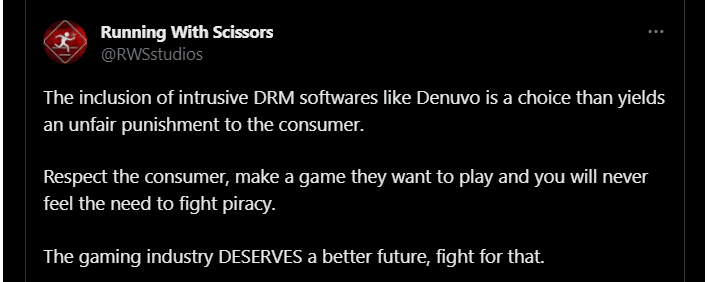Game Developer Goes Postal On Denuvo Saying DRM Unfairly Punishes Consumers
Running With Scissors doesn't actually raise any specific complaints against Denuvo, but that's okay, because we will. To be clear, Denuvo's anti-piracy and anti-tamper software is good for the short-term bottom line of game publishers because there are only a few people in the world capable of breaking it. It's very complex polymorphic encryption, and not only is it extremely difficult and labor-intensive to crack, it's also quite literally illegal to do so in the United States thanks to misguided laws against breaking encryption.
Denuvo's software also has a reputation for causing poor performance in games. The company has repeatedly attempted to shed this notion by presenting benchmarks, but third-party testing has been inconclusive either way in aggregate; some games on some systems do seem to run worse with Denuvo, while other systems or other games seem to have no problems. Considering the extra memory load and the extra processing required by the technology, we expect that most gaming PCs can probably just absorb it with no real impact, but there remains the possibility of performance losses on lower-end and older systems. It also might cause extra battery drain on mobile platforms.
Running With Scissors' tweet advises other developers to "make a game [consumers] want to play and you'll never feel the need to fight piracy." Indeed, two of the biggest game launches this year, being Bethesda's Starfield and Larian's Baldur's Gate 3, don't use Denuvo's DRM, and in fact the latter title has no DRM whatsoever. Despite that, both games are pushing sales in the millions, although it wouldn't surprise us if Baldur's Gate 3 is actually more profitable thanks to the lower production cost.




